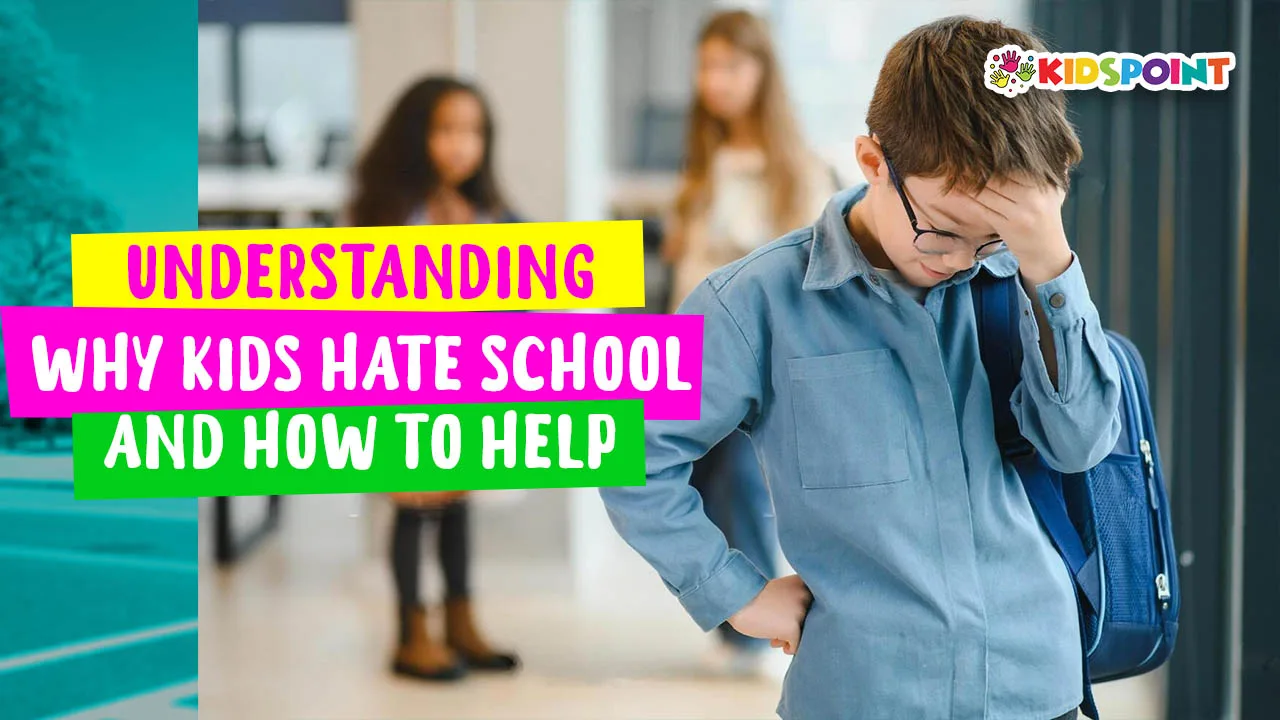Children often express dislike or even hatred for school, leaving parents and educators concerned and searching for solutions. Understanding the reasons behind these feelings is crucial in addressing the issue and creating a supportive environment where kids can thrive. In this comprehensive guide, The Kids Point delves into why kids might hate school and explores actionable strategies to help them overcome these challenges.
Why Kids Hate School: Common Causes
Academic Pressure
Modern educational systems can place significant demands on children. Tests, homework, and the pressure to perform well can overwhelm students. For some, these pressures lead to stress and anxiety, making school a place they dread.
Bullying and Social Challenges
Bullying remains a pervasive issue in schools worldwide. Whether physical, verbal, or online, it can significantly impact a child’s mental health and make school an unsafe space. Additionally, difficulties in forming friendships or fitting in socially can contribute to feelings of isolation.
Lack of Interest in Subjects
Not every child connects with the subjects taught in school. A rigid curriculum may fail to engage a child’s unique interests or preferred learning styles, leaving them bored or disengaged.
Undiagnosed Learning Difficulties
Learning disabilities, such as dyslexia or ADHD, can make academic tasks feel insurmountable. When these challenges go unrecognized, kids may develop a negative attitude toward school, feeling misunderstood or incapable.
Negative Teacher-Student Relationships
Teachers play a pivotal role in a child’s school experience. Negative interactions, such as favoritism, harsh discipline, or lack of understanding, can sour a student’s perception of school.
Family or Personal Issues
External factors, such as family problems, health concerns, or trauma, can affect how a child views school. For example, a child dealing with divorce or grief might lack the emotional energy to engage with their studies.
Rigid or Overwhelming Schedules
Long hours, minimal breaks, and structured days can make school feel stifling. Children often need downtime to process their thoughts, which a tightly packed schedule might not allow.
How to Help Kids Who Hate School
Open the Lines of Communication
One of the most effective ways to address school-related issues is by talking to your child.
- Ask open-ended questions: Instead of asking, “Did you have a good day?” try “What was the most challenging part of your day?”
- Validate their feelings: Let your child know their concerns are heard and taken seriously.
Identify the Root Cause
Understanding why your child dislikes school is crucial.
- Observe their behavior: Are they anxious in the morning? Do they struggle with homework?
- Seek feedback from teachers: Teachers can provide insights into classroom dynamics, academic challenges, or social issues.
Address Academic Pressure
Help your child manage academic demands:
- Set realistic expectations: Encourage effort over perfection.
- Develop time-management skills: Teach them how to break tasks into manageable chunks.
- Consider tutoring: A tutor can provide personalized support in challenging subjects.
Combat Bullying
Bullying requires immediate intervention.
- Report bullying incidents: Work with school officials to ensure your child’s safety.
- Teach coping strategies: Help your child practice assertive communication and build self-confidence.
- Foster friendships: Encourage participation in clubs or activities where they can meet like-minded peers.
Make Learning Fun and Relevant
If your child is bored or disengaged, try to spark their interest:
- Connect lessons to real-life situations: For instance, relate math to cooking or shopping.
- Incorporate hands-on activities: Science experiments, art projects, and field trips can make learning exciting.
Screen for Learning Difficulties
If you suspect undiagnosed learning challenges, consult a specialist.
- Pursue evaluations: Schools often provide assessments, but private evaluations can also be beneficial.
- Advocate for accommodations: Ensure your child receives support such as extra time on tests or tailored instruction.
Strengthen Teacher-Student Relationships
Building a positive rapport with teachers can improve a child’s experience.
- Schedule parent-teacher meetings: Share insights about your child’s strengths and challenges.
- Encourage your child to seek help: Teach them how to approach teachers with questions or concerns.
Create a Supportive Home Environment
A nurturing home can buffer school-related stress.
- Establish routines: Consistent schedules for homework, meals, and sleep provide stability.
- Celebrate small wins: Acknowledge your child’s efforts and progress, no matter how small.
- Encourage relaxation: Ensure your child has time for hobbies, play, and relaxation.
Explore Alternative Education Options
If traditional schooling isn’t working, consider other options:
- Homeschooling: Provides a tailored education plan in a flexible environment.
- Online schools: Allow children to learn at their own pace.
- Montessori or Waldorf schools: Focus on hands-on, student-centered learning.
Seek Professional Help
Sometimes, outside intervention is necessary.
- Therapists: Can address anxiety, depression, or trauma that may be affecting school experiences.
- Educational consultants: Can help identify suitable schools or programs for your child’s needs.
How Schools Can Help
Schools also play a vital role in ensuring students feel supported:
- Implement anti-bullying programs: Create a safe and inclusive school culture.
- Train teachers on mental health: Equip educators to recognize and address emotional and social challenges.
- Offer diverse extracurricular activities: Help students discover and pursue their passions.
- Promote flexible learning approaches: Encourage project-based or experiential learning to cater to varied interests and abilities.
Signs Your Child Is Struggling with School
Look out for these warning signs, which might indicate deeper issues:
- Sudden drop in grades.
- Physical symptoms like headaches or stomachaches.
- Avoidance behavior (e.g., pretending to be sick to skip school).
- Changes in mood, such as irritability or withdrawal.
- Negative comments about self-worth.
If you notice these signs, act promptly to provide support.
When a child says they hate school, it’s essential to listen and investigate the underlying reasons. By fostering open communication, addressing specific challenges, and collaborating with teachers and professionals, parents can help transform school from a source of dread to a place of growth and discovery. At The Kids Point, we believe that every child deserves an environment where they feel safe, valued, and inspired to learn. Together, we can make that vision a reality.


